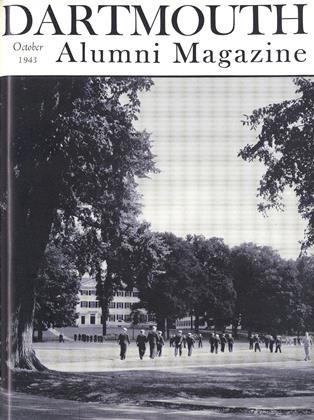Henry C. Morrison '95. Univ. of Chicago Press, 1943, pp. 321. $3.00
A book worthy of a Dartmouth valedictorian, who, four years out of college, was an efficient city superintendent, and whose reforms of 1917-19 made New Hampshire educationally, a model state. No short review can adequately describe this excellent discourse. It should be read by every American school executive and school board member. Many writers on school administration are college theorists who exemplify Shaw's "He who cannot, teaches." Morrison has been through the mill, himself.
There are three parts to the volume: 1, Major Educational Institutions, (a) the School —a true common school, which shall bring an individual to maturity, social, volitional, intellectual; (b) the University—very different from our present "universities"; (c) the Technological Institute. 11, School Structure, a condensed history: how the American school was influenced by German ideals, how often it "just growed," how various surroundings modified it. "The Head of the School" and "The City Superintendency" are two admiral chapters. 111, "School System," too strong to be ignored, is a plea for the abolition of country (and county) "deestricts" and the organization of a state-controlled education, not unlike that which the author, aided by his successor, actually accomplished in New Hampshire.
Quotable ideas fill the book: A real university would accept no students except the educationally mature. Can't the country produce enough to go around without utilizing the labor of minors? We fall into war because there is no public intelligence about world aliairs. There is the delusion that academic standards are a matter of time-to-bespent. We don't allow the wealthier sections to monopolize the best judges. (Why, then, teachers?)
An excellent book; if there is a touch of John Locke in the plea for discipline, and if the University Plan is too reminiscent of Hutchins, the main theme of the volume is sound, keen and convincing.
 View Full Issue
View Full Issue
More From This Issue
-
 Article
ArticleDartmouth War Directory
October 1943 -
 Article
ArticleTHE GIFTED CROSBYS
October 1943 By L. B. RICHARDSON '00 -
 Article
ArticleA LESSON IN ADAPTABILITY
October 1943 By H. F. W. -
 Class Notes
Class Notes1937
October 1943 By JOHN H. DEVLIN JR., FRANCIS T. FENN, JR. -
 Class Notes
Class Notes1918
October 1943 By EARNEST H. EARLEY, DONALD L. BARR -
 Class Notes
Class Notes1917
October 1943 By MOTT D. BROWN JR., DONALD BROOKS
Louis P. Benezet '99
-
 Letters to the Editor
Letters to the EditorAstronomer Fox '02
March 1936 -
 Letters to the Editor
Letters to the EditorLetters
April 1955 -
 Books
BooksCITIZENSHIP AND CIVIC AFFAIRS,
May 1940 By Louis P. Benezet '99 -
 Books
BooksTHE FINANCING OF GRANT-AIDED EDUCATION IN ENGLAND AND WALES
June 1940 By Louis P. Benezet '99 -
 Books
BooksTHAT MEN MAY UNDERSTAND
May 1941 By Louis P. Benezet '99 -
 Books
BooksDID THEY SUCCEED IN COLLEGE?
October 1942 By Louis P. Benezet '99
Books
-
 Books
BooksTHE LAST TIME I SAW THEM,
August 1946 By Herbert F. West '22 -
 Books
BooksCRUSADE
October 1952 By James F. Cusick -
 Books
BooksTHE FACTS OF WIFE.
JUNE 1968 By JOAN LOVE JOY HIER -
 Books
BooksTHE SIGNAL NET.
March 1954 By ROBERT S. MONAHAN '29 -
 Books
BooksAMERICAN LABOR UNIONS; ORGANIZATION, AIMS, AND POWER.
July 1950 By Robert Swanton -
 Books
BooksRELATION OF FAILURE TO PUPIL SEATING.
December 1932 By W. R. W.

